 W
WSir Edmund Affleck, 1st Baronet was a naval officer of considerable repute.
 W
WSamuel Ayscough (1745–1804) was a librarian and indexer, who was described as the "Prince of Index Makers".
 W
WJoanna Baillie was a Scottish poet and dramatist, known for such works as Plays on the Passions and Fugitive Verses (1840). She shows her interest in moral philosophy and the Gothic. She was critically acclaimed in her lifetime, and while living in Hampstead, associated with literary contemporaries such as Anna Barbauld, Lucy Aikin, and Walter Scott. She died at the age of 88.
 W
WGiuseppe Marc'Antonio Baretti was an Italian literary critic, poet, writer, translator, linguist and author of two influential language-translation dictionaries. During his years in England he was often known as Joseph Baretti. Baretti's life was marked by controversies, to the point that he had to leave Italy, for England, where he remained for the rest of his life.
 W
WLady Anne Barnard was a Scottish travel writer, artist and socialite, and the author of the ballad Auld Robin Gray. Her five-year residence in Cape Town, South Africa, although brief, had a significant impact on the cultural and social life of the time.
 W
WAgnes Beaumont was a British religious autobiographer who was accused of having a sexual relationship with the Puritan preacher John Bunyan and conspiring with him to murder her father. She wrote an autobiography that declared her innocence of these charges.
 W
WMargaret Bingham, Countess of Lucan was an English painter, copyist and poet, whose art was much admired by Horace Walpole. Her pseudonymous Verses on the Present State of Ireland made a strong protest against Britain's treatment of the country.
 W
WRev. Jonathan Boucher, FRSE, FSA was an English clergyman, teacher, preacher and philologist.
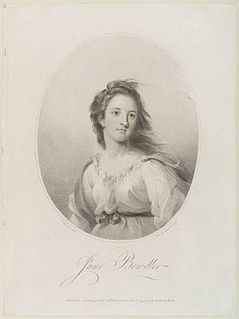 W
WJane Bowdler (1743–1784) was an English poet and essayist. Her work gained longstanding popularity after her death.
 W
WBarbarina Brand, Lady Dacre, was an English poet, playwright, and translator. In addition to her writing, she sculpted, rode, was proficient in both French and Italian, and maintained an extensive correspondence with a circle of other literary women, including Joanna Baillie, Mary Russell Mitford, and Catherine Maria Fanshawe.
 W
WRichard Brothers was an early believer and teacher of British Israelism, a theory concerning the Lost Ten Tribes of Israel.
 W
WEdmund Burke was an Irish statesman and philosopher. Born in Dublin, Burke served as a member of parliament (MP) between 1766 and 1794 in the House of Commons of Great Britain with the Whig Party after moving to London in 1750.
Margaret Calderwood was a Scottish diarist just after the Jacobite uprising of 1745. She wrote of her journeys through England to Brussels, but this work was not published until the 19th century.
 W
WJane Cave (1754?-1812) was a poet who was probably born in Talgarth and died in Newport in Wales. She wrote in English and moved around England during her lifetime. She is particularly known for her poetry on religious subjects and on her headaches.
 W
WSusanna Centlivre, born Susanna Freeman and also known professionally as Susanna Carroll, was an English poet, actress, and "the most successful female playwright of the eighteenth century". Centlivre's "pieces continued to be acted after the theatre managers had forgotten most of her contemporaries." During a long career at the Theatre Royal, Drury Lane, she became known as the second woman of the English stage, after Aphra Behn.
 W
WHester Chapone, née Mulso, was an English writer of conduct books for women. She became associated with the London Bluestockings.
 W
WElizabeth Cobbold or Carolina Petty Pasty born Elizabeth Knipe was a British writer and poet.
 W
WHannah Cowley was an English dramatist and poet. Although Cowley's plays and poetry did not enjoy wide popularity after the 19th century, critic Melinda Finberg rates her as "one of the foremost playwrights of the late eighteenth century" whose "skill in writing fluid, sparkling dialogue and creating sprightly, memorable comic characters compares favourably with her better-known contemporaries, Goldsmith and Sheridan." Cowley's plays were produced frequently in her lifetime. The major themes of her plays - including her first, The Runaway (1776), and her major hit which is being revived, The Belle's Stratagem (1780) - revolve around marriage and how women strive to overcome the injustices imposed by family life and social custom.
 W
WElizabeth, Princess Berkeley, sometimes unofficially styled Margravine of Brandenburg-Ansbach, previously Elizabeth Craven, Baroness Craven, of Hamstead Marshall, was an author and playwright, perhaps best known for her travelogues. She was the third child of the 4th Earl of Berkeley, and was born in Mayfair in the West End of London.
 W
WOttobah Cugoano, also known as John Stuart, was a abolitionist, political activist and natural rights philosopher from West Africa who was active in Britain in the latter half of the eighteenth century. Captured in the Gold Coast and sold into slavery at the age of 13, he was shipped to Grenada in the West Indies. In 1772 he was purchased by a merchant who took him to England, where he learnt to read and write, and was freed following the ruling in the Somersett Case (1772). Later working for artists Richard and Maria Cosway, he became acquainted with several British political and cultural figures. He joined the Sons of Africa, a group of African abolitionists in Britain.
 W
WMary Delany was an English artist, letter-writer, and bluestocking, known for her "paper-mosaicks" and botanic drawing, needlework and her lively correspondence.
 W
WPhilip Falle (1656–1742) was a clergyman and historian of Jersey.
 W
WEllenor Fenn was a prolific 18th-century British writer of children's books.
 W
WLady Gwendolen Gascoyne-Cecil was a British author who wrote a four-volume biography of her father, Robert Gascoyne-Cecil, entitled Life of Robert, Marquis of Salisbury. She also wrote a short story called The Little Ray for the August 1894 edition of Pall Mall Magazine.
 W
WJane Gomeldon was an English writer, poet and adventurer. Her writing has gained her posthumous recognition as an early feminist.
 W
WJohn Zephaniah Holwell FRS was a surgeon, an employee of the British East India Company, and a temporary Governor of Bengal (1760). He was also one of the first Europeans to study Indian antiquities.
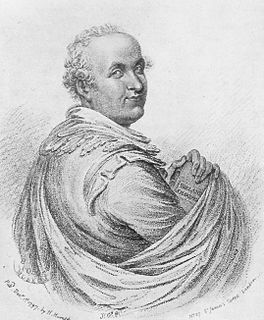 W
WSamuel Ireland, English author and engraver, is best remembered today as the chief victim of the Ireland Shakespeare forgeries created by his son, William Henry Ireland.
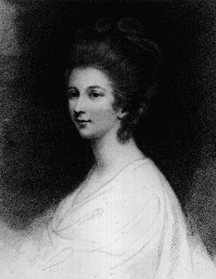 W
WCharlotte Lennox, née Ramsay, was a Scottish novelist, playwright and poet, mostly remembered today as the author of The Female Quixote, and for her association with Samuel Johnson, Joshua Reynolds and Samuel Richardson. However, she had a long career in her own right.
 W
WSarah Churchill, Duchess of Marlborough, Princess of Mindelheim, Countess of Nellenburg, was an English courtier who rose to be one of the most influential women of her time through her close friendship with Anne, Queen of Great Britain. Sarah's friendship and influence with Princess Anne were widely known, and leading public figures often turned their attentions to her, hoping for favor from Anne. By the time Anne became Queen, Sarah’s knowledge of government and intimacy with the queen had made her a powerful friend and a dangerous enemy.
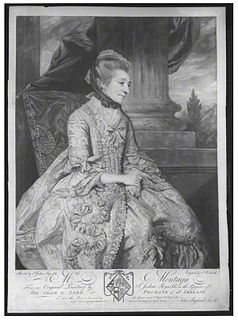 W
WElizabeth Montagu was a British social reformer, patron of the arts, salonnière, literary critic and writer, who helped to organize and lead the Blue Stockings Society. Her parents were both from wealthy families with strong ties to the British peerage and learned life. She was sister to Sarah Scott, author of A Description of Millenium [sic] Hall and the Country Adjacent. She married Edward Montagu, a man with extensive landholdings, to become one of the richer women of her era. She devoted this fortune to fostering English and Scottish literature and to the relief of the poor.
 W
WHannah More was an English religious writer and philanthropist, remembered as a poet and playwright in the circle of Johnson, Reynolds and Garrick, as a writer on moral and religious subjects, and as a practical philanthropist. Born in Bristol, she taught at a school founded there by her father and began writing plays. She became involved with the London literary elite and a leading Bluestocking member. Her later plays and poetry became more evangelical and she joined a group campaigning against the slave trade. In the 1790s she wrote several Cheap Repository Tracts on moral, religious and political topics for distribution to the literate poor. Meanwhile, she broadened her links with schools that she and her sister Martha had founded in rural Somerset. These modelled her strictures on the education of the poor, permitting a limited reading ability but no writing.
 W
WMary Palmer was a British author from Devon who wrote Devonshire Dialogue, once considered the "best piece of literature in the vernacular of Devon". She was the mother of painter Theophila Gwatkin and sister of the artists Sir Joshua Reynolds and Frances Reynolds and of the pamphleteer Elizabeth Johnson.
 W
WLucy Peacock was a British author, editor, translator, bookseller and publisher of children's books during the late eighteenth century. She wrote anonymously, for children and young adults. Possibly she was married or perhaps in partnership with one or members of her family, since 'R. and L. Peacock,' which published a number of items at the Juvenile Library, No. 259, Oxford-Street from at least 1796 to 1810.
 W
WCatherine Phillips, born Payton was a Quaker Minister, who travelled in England, Wales, Scotland, Holland and the American colonies. Her first name is sometimes spelt "Catharine".
 W
WTeresia Constantia Phillips or Con Phillips was a British courtesan and bigamist who published a scandalous autobiography.
 W
WMary Pix was an English novelist and playwright. As an admirer of Aphra Behn and colleague of Susanna Centlivre, Pix has been called "a link between women writers of the Restoration and Augustan periods".
 W
WSusanna Rowson, née Haswell was a British-American novelist, poet, playwright, religious writer, stage actress, and educator, considered the first woman geographer and supporter of female education and wrote against slavery. Rowson was the author of the 1791 novel Charlotte Temple, the most popular best-seller in American literature until Harriet Beecher Stowe's Uncle Tom's Cabin was published serially in 1851-1852 and authored the first human geography textbook Rowson's Abridgement of Universal Geography in 1805.
 W
WCharles Ignatius Sancho was a British abolitionist, writer and composer. Born on a slave ship in the Atlantic, Sancho was sold into slavery in the Spanish colony of New Grenada. After his parents died, Sancho's owner took the two-year old orphan to England and gifted him to three Greenwich sisters, where he remained their slave for eighteen years. Unable to bear being a servant to them, Sancho ran away to the Montagu House, whose owner had taught him how to read and encouraged Sancho's budding interest in literature. After spending some time as a servant in the household, Sancho left and started his own business as a shopkeeper, while also starting to write and publish various essays, plays and books.
 W
WJane M. Scott (1779–1839) was a British theatre manager, performer, and playwright.
 W
WFrances Sheridan was an Anglo-Irish novelist and playwright.
 W
WHelen D'Arcy Stewart was Scottish poet and a noted Edinburgh society hostess of the late 18th and early 19th century, as wife to Dugald Stewart, an influential Scottish philosopher and mathematician best known for popularizing the Scottish Enlightenment.
 W
WJohn "Walking" Stewart was an English philosopher and traveller. Stewart developed a unique system of materialistic pantheism.
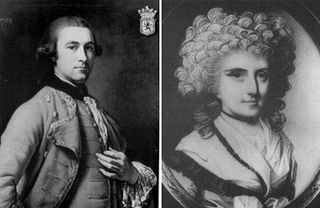 W
WMary Eleanor Bowes, Countess of Strathmore and Kinghorne was a notable member of the British aristocracy during the Georgian period (18th-century).
 W
WMary Wells, afterwards Mrs. Sumbel, was an English actress and memoirist.
 W
WAgnes Wheeler or Ann Coward was a British writer on the Cumbrian dialect. She is known for one book published in 1790. The Westmorland Dialect, in three familiar Dialogues: in which an Attempt is made to illustrate the provincial Idiom was an early attempt at recording the local dialect. There were four editions of the book. Her work was later used in Specimens of the Westmorland Dialect published by the Revd Thomas Clarke in 1887.
 W
WHelen Maria Williams was a British novelist, poet, and translator of French-language works. A religious dissenter, she was a supporter of abolitionism and of the ideals of the French Revolution; she was imprisoned in Paris during the Reign of Terror, but nonetheless spent much of the rest of her life in France.
 W
WThe lifetime of British writer, philosopher, and feminist Mary Wollstonecraft (1759–1797) encompassed most of the second half of the eighteenth century, a time of great political and social upheaval throughout Europe and America: political reform movements in Britain gained strength, the American colonists successfully rebelled, and the French revolution erupted. Wollstonecraft experienced only the headiest of these days, not living to see the end of the democratic revolution when Napoleon crowned himself emperor. Although Britain was still revelling in its mid-century imperial conquests and its triumph in the Seven Years' War, it was the French revolution that defined Wollstonecraft's generation. As poet Robert Southey later wrote: "few persons but those who have lived in it can conceive or comprehend what the memory of the French Revolution was, nor what a visionary world seemed to open upon those who were just entering it. Old things seemed passing away, and nothing was dreamt of but the regeneration of the human race."
 W
WDorothy Mae Ann Wordsworth was an English author, poet, and diarist. She was the sister of the Romantic poet William Wordsworth, and the two were close all their adult lives. Wordsworth had no ambitions to be a public author, yet she left behind numerous letters, diary entries, topographical descriptions, poems, and other writings.
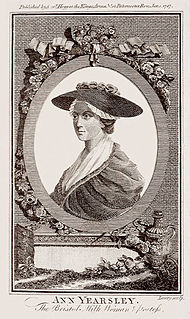 W
WAnn Yearsley, née Cromartie, was an English poet and writer from a lowly social background. The poet Robert Southey wrote a biography of her.